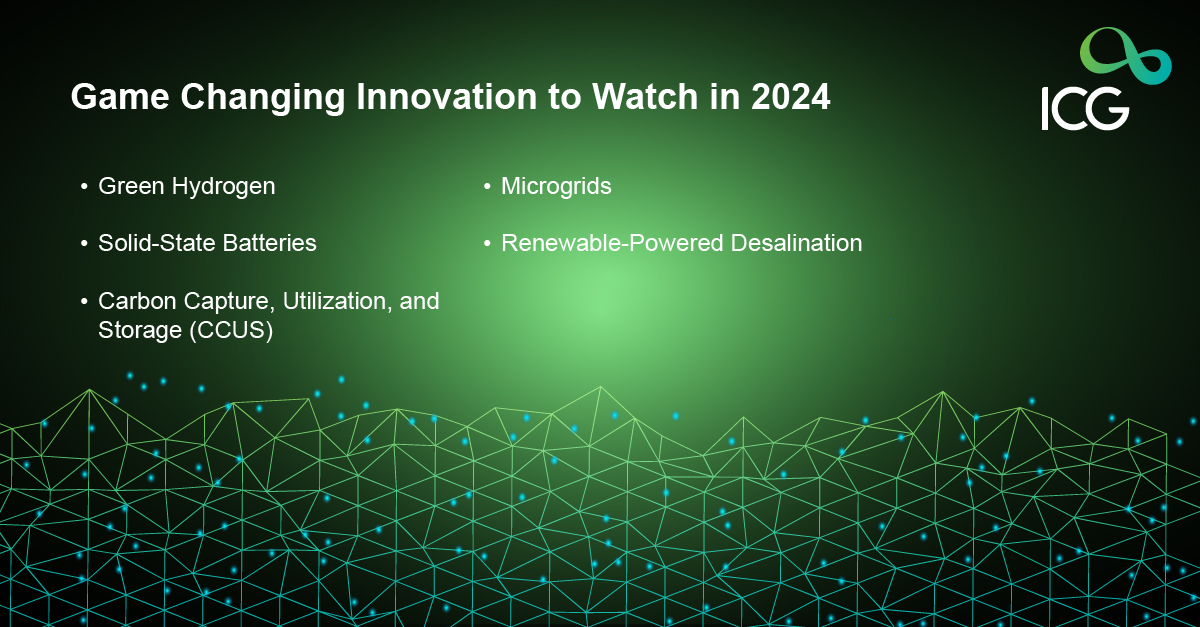Game-Changing Clean Tech to Watch in 2024
The clean tech industry is evolving at an unprecedented pace, driven by the urgency to combat climate change and transition to a more sustainable future. Clean technology spans several sectors such as the:
- Renewable Energy
- Sustainable Transportation
- Energy Efficiency
- Waste Management
As the global community focuses on reducing carbon emissions, several groundbreaking innovations are emerging to reshape how we generate, store, and consume energy. In this article, we’ll explore the game changing clean tech to watch in 2024.
Oceans: Key Players in Climate Regulation
Oceans cover 70% of Earth’s surface and play a vital role in global commerce, marine ecosystems, and human life. They provide food, energy, and recreation, and serve as popular vacation destinations. Over 60% of the global population lives within 150 kilometers of a coast, highlighting their significance.
Beyond these direct benefits, oceans are essential in regulating the planet’s climate by acting as carbon sinks. Each year, human activities release approximately 40 gigatons of CO2 from fossil fuel use. Terrestrial ecosystems absorb around 13 gigatons, while oceans capture about 9 gigatons, leaving a net increase of 18 gigatons of CO2 in the atmosphere. As offshore technologies develop, we must prioritize protecting the oceans’ environmental functions to maintain this critical balance.
Tackling Carbon Emissions for Sustainable Operations by 2025
As industries move toward sustainable operations, reducing carbon emissions remains a top priority. Advances in clean technology are paving the way for a greener future. Here are some of the key innovations to watch in 2024.
Green Hydrogen: Powering the Future
Green hydrogen is a promising innovation in clean energy. Unlike traditional hydrogen, which is produced using fossil fuels, green hydrogen is generated using renewable energy sources like wind and solar. This makes it a truly sustainable option.
According to McKinsey, green hydrogen is already attracting global investments worth $70 billion as countries like Germany, Australia, and Japan aggressively expand projects in this area. With technology advancements, green hydrogen could play a significant role in decarbonizing sectors that are difficult to electrify, such as heavy transportation and industrial processes like steel production.
Advanced Energy Storage Solutions
Renewable energy sources like wind and solar are intermittent, meaning they do not generate energy continuously. Energy storage technologies address this challenge by storing excess energy produced during peak times for later use. While lithium-ion batteries are the current standard, new energy storage solutions promise greater efficiency, lower costs, and longer storage durations.
Solid-state batteries are a game-changer in this space. As noted by Statista, the solid-state battery market is projected to reach $6 billion by 2030. These batteries are safer and more energy-dense than traditional lithium-ion batteries, making them ideal for electric vehicles (EVs) and renewable energy grids. Flow batteries, capable of storing vast amounts of energy, are also gaining traction for grid-scale storage.
Carbon Capture, Utilization, and Storage (CCUS)
Despite the rise of renewable energy, many industries still depend on fossil fuels, contributing to global carbon emissions. Carbon capture, utilization, and storage (CCUS) technologies aim to capture CO2 emissions at the source and either store them underground or repurpose them for other uses, such as in agriculture or manufacturing.
According to Gartner, CCUS could reduce industrial emissions by up to 14% by 2040. Recent advancements have made these technologies more scalable and affordable. Companies are now developing carbon capture systems that can be retrofitted onto existing infrastructure, ensuring that industries can meet stricter emissions regulations without major overhauls.

Electric Vehicles (EVs) and Solid-State Batteries
The EV revolution is accelerating, with automakers worldwide working to electrify their fleets. However, battery technology remains a challenge for widespread EV adoption. Solid-state batteries, which use a solid electrolyte instead of the liquid electrolyte found in lithium-ion batteries, offer a solution. They provide greater energy density, faster charging times, and improved safety.
This innovation is set to boost the range and performance of EVs. Statista reports that by 2025, solid-state batteries could extend EV driving ranges by up to 50%. These batteries are also less prone to overheating, making them suitable for a broader range of applications, including renewable energy storage.
Circular Economy: Recycling and Reusing Resources
The circular economy is gaining momentum as an effective strategy for reducing waste and conserving resources. In a circular economy, products and materials are designed to be reused, repaired, or recycled, reducing the need for raw materials and minimizing environmental impact.
Innovations in recycling technologies are making it easier to recover valuable materials from waste streams. For example, companies are developing methods to more efficiently recycle plastics, metals, and electronic waste. Additionally, biodegradable materials are helping reduce the environmental impact of everyday items, such as single-use plastics and packaging.
Microgrids and Decentralized Energy Systems
Traditional energy grids are centralized, with energy generated at a few large power plants and distributed to consumers. Microgrids, however, are emerging as a more sustainable and resilient alternative. They allow communities, businesses, or individual buildings to generate their own electricity, often from renewable sources, and operate independently of the larger grid.
Microgrids are especially valuable in regions with frequent power outages or unreliable electricity access. These systems can integrate with energy storage solutions, making them more flexible and capable of supporting a larger share of renewable energy. As more communities and businesses seek energy independence, microgrids will become increasingly important in the clean energy transition.
Renewable-Powered Desalination
As water scarcity worsens in many parts of the world, innovations in desalination technology are becoming crucial. Traditional desalination methods are energy-intensive and often rely on fossil fuels. However, new technologies now make it possible to desalinate water using renewable energy sources like solar and wind.
Solar-powered desalination, for example, offers a sustainable solution to water shortages in arid regions. IMF reports that renewable-powered desalination could provide clean water for over 2 billion people by 2030, significantly reducing the carbon footprint associated with water extraction and treatment.
A Greener Future on the Horizon
The clean tech industry is filled with innovations that have the potential to transform how we live, work, and interact with the environment. From green hydrogen and solid-state batteries to carbon capture and microgrids, these technologies are paving the way for a more sustainable future. Although many of these innovations are in their early stages, their potential to reduce carbon emissions and promote sustainability is undeniable.
As investments in clean tech increase, we can expect more breakthroughs that will accelerate the global transition to a low-carbon economy. By staying informed and supporting these emerging technologies, businesses and individuals can help build a cleaner, greener, and more sustainable world.
The ICG Approach
At ICG, we offer a customized approach that empowers your teams with the latest insights and technology expertise to navigate the demands of today’s digital age. As Saudi Arabia embarks on its digital transformation journey, ICG plays a pivotal role in shaping the Kingdom’s tech landscape by providing cutting-edge solutions, strategic consultancy, and fostering innovation. Our comprehensive guidance, from fundamental concepts to practical implementation, helps organizations mitigate risks, stay ahead of the competition, and unlock their full potential in the accelerating digital environment.
Ready to talk?
Request your free Consultation to learn more about ICG’s capabilities and enablement to embark on a transformative expedition toward the summit of success.








